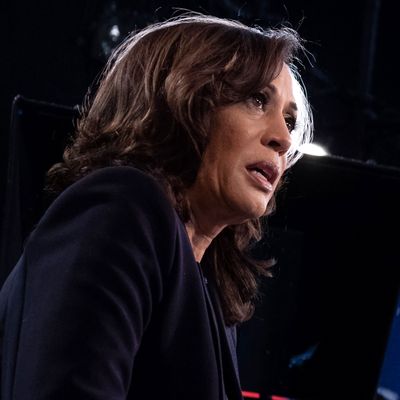
It’s a grand thing to be Kamala Harris right now. She is basking in the near-universal feeling that she was the star of Thursday’s second Democratic primary debate, probably even overshadowing first-night champ Elizabeth Warren. My colleague Jonathan Chait’s judgment that she is about to join the top tier of candidates sounds entirely plausible. Moreover, the qualities she exhibited — a commanding presence, excellent timing, a knack for controlled emotional expressions, and toughness in close combat — should continue to serve her well in future debates. But she and her team cannot forget for a moment that there are at least three more rounds of debates (in July, September, and October) coming up before voters start voting. And history is replete with debate stars who subsequently flop, like her fellow Californian Carly Fiorina in 2015. (Remember her?)
Beyond the challenge of meeting heightened expectations, Harris’s strategy for winning the Democratic nomination remains tricky going forward. To recapitulate, her path to victory is a modified version of the one Barack Obama pursued in 2008. She needs to perform well enough in Iowa and New Hampshire to stay credible, perhaps do better in Nevada, and have a strong finish in majority-black South Carolina. Then she must spring into a clear lead with a win in her home state of California, which votes just three days later. It’s all quite doable, but doesn’t leave much room for error.
Aside from her overall performance, the most important step she took in the first debate was to challenge — very directly — Joe Biden’s grip on the black voters she’ll need in South Carolina and beyond. If that doesn’t happen right away, it won’t be the first time others have underestimated Biden’s strength in that demographic. But it’s doubtful Harris can win the nomination unless she essentially does to Biden what Barack Obama did to Hillary Clinton, who also had tremendous early strength among African-Americans in 2008.
Harris will also face fresh challenges from other candidates who did well in the first round of debates. Surprise night-one star Julián Castro absolutely must do well in Latino-heavy Nevada and California (along with his home state of Texas, which votes the same day as California) to survive. Cory Booker did well on the first night, too. He’s pursuing his own version of the Obama strategy, and has an Iowa organization that’s more like Obama’s than is Harris’s at present. And Elizabeth Warren (another candidate with a strong Iowa organization) burnished her first-tier credentials in the initial debate as well. Her emergence as a potential “unity candidate” in recent weeks places her in a role Harris needs to take away from her sooner or later.
Beyond these competitors for star-debater status, the ever-changing expectations game is particularly perilous for California’s favorite daughter. Thanks to its rich delegate haul and reputation as the Democratic Party’s fundraising ATM, many rivals will try to play hard on Harris’s home turf, as was evidenced recently when most of the field showed up for the California Democratic Party convention in San Francisco, the city where she served as district attorney for six years. Bernie Sanders, in particular, has a strong and vocal following in the state left over from his 2016 campaign.
Without question, Kamala Harris is in a much stronger position than she was this time last week, and is beginning to show the kind of promise that made her an early smart-money favorite to win it all. But she’ll need luck as well as skill to navigate the winding and pothole-filled road ahead.






























